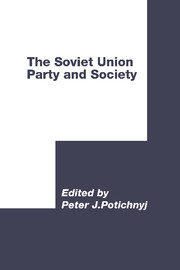Book contents
- Frontmatter
- Contents
- List of figures
- List of tables
- List of contributors
- Foreword by R. C. Elwood
- Preface by P. J. Potichnyj
- Part 1 Party apparat
- Part 2 Socialization and political discourse
- 4 Political socialization in the USSR: April 1979 and after
- 5 Political language and political change in the USSR: notes on the Gorbachev leadership
- 6 Soviet political discourse, narrative program and the Skaz theory
- 7 The nationality policy of the CPSU and its reflection in Soviet socio-political terminology
- 8 The evolution of the local soviets
- Part 3 Social policy
- Index
- Publications from the Third World Congress for Soviet and East European Studies
4 - Political socialization in the USSR: April 1979 and after
from Part 2 - Socialization and political discourse
Published online by Cambridge University Press: 04 August 2010
- Frontmatter
- Contents
- List of figures
- List of tables
- List of contributors
- Foreword by R. C. Elwood
- Preface by P. J. Potichnyj
- Part 1 Party apparat
- Part 2 Socialization and political discourse
- 4 Political socialization in the USSR: April 1979 and after
- 5 Political language and political change in the USSR: notes on the Gorbachev leadership
- 6 Soviet political discourse, narrative program and the Skaz theory
- 7 The nationality policy of the CPSU and its reflection in Soviet socio-political terminology
- 8 The evolution of the local soviets
- Part 3 Social policy
- Index
- Publications from the Third World Congress for Soviet and East European Studies
Summary
Since at least the revolution the Soviet system has been distinctive in the attention it has devoted to the ideological upbringing of its citizens. As presently constituted, the party's ideological work embraces a variety of forms which are intended, taken together, to reach all members of the society from childhood to late adult years and to inculcate in them the basis of a “communist world outlook.” Among the most important of such forms, are first of all, mass agitation and propaganda work, which is conducted by agitators, political informants and lecturers in workplaces and residential areas throughout the USSR. A further contribution is made by the 3.1 million members of the “Znanie” (Knowledge) Society, who delivered 25.1 million lectures on party-political as well as scientific and other themes in 1983 to a total audience in excess of 1.1 billion. Secondly, there is an elaborate system of political and economic study, intended particularly for party members, in which over 60 million adults were enrolled in 1984–85. In the educational system itself both the curriculum and the youth organizations based around the school are intended to play a role in developing a communist consciousness, with the Komsomol, in particular, sponsoring a system of formal political instruction for its 42 million members headed by a Higher Komsomol School based in Moscow. The mass media have an additional part to play in extending the party's interpretation of current domestic and international developments to Soviet citizens of all ages.
- Type
- Chapter
- Information
- The Soviet Union: Party and Society , pp. 67 - 86Publisher: Cambridge University PressPrint publication year: 1988
- 1
- Cited by



